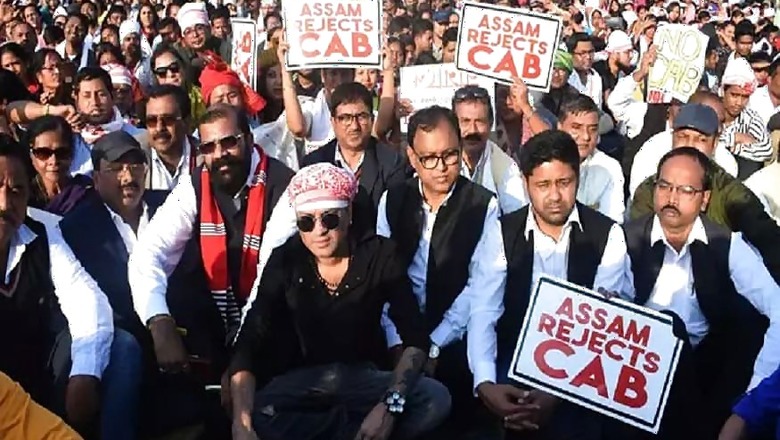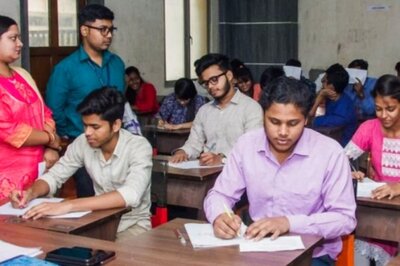Music, Art Tie Them as Zubeen Garg and a Host of Assamese Artistes Lead Anti-CAA Stir from the Front

views
‘Mrityu jodi xilpo hoi…mrityu kidore xulobh’ (If death is an art, how death is so easily available).
Zubeen Garg’s emotional rendition of his old popular Assamese number literally brought tears in the eyes of many who saw him performing among the crowd gathered to protest against the contentious Citizenship Amendment Act (CAA) at the Assam Engineering Institute’s playground in Chandmari, Guwahati, on Thursday.
The crowd spontaneously joined Zubeen’s emotional tribute to the five lives lost during the ongoing agitation in the state. Among those killed in the past few days, four were from Guwahati, including two minors Sam Stafford and Dipanjal Das.
Zubeen’s poignant homage while singing ‘Jiwon diyar khyomotanu kar? Jiwon luwar khyomota opar’ (Who has the power to give life? Power of taking life is limitless) touched an emotional chord with people on the ground and even with those watching him on live television.
The popular singer, who is at forefront of the anti-CAA stir, has urged people to maintain calm and protest in a democratic manner.
As Assam vows to fight against the controversial law with the help of a non-violent, democratic ‘satyagrah’ (movement), the artist community, especially Zubeen through his music, is reaffirming the people’s stand.

During a peaceful anti-Citizenship Amendment Act agitation in Guwahati.
Also known for his belting a number of hit Bollywood numbers, Zubeen had earlier attacked the state government with his composition ‘Politics nokoriba bondhu’ (Don’t do politics my friend). The song echoed with enraged Assamese fooled by generations of political leaders with their promises of wiping out illegal Bangladeshi’s from the land.
He sang ‘Montri MLA sab papad he matro, dekhiboloi khadyo, asolote xobdo' (Ministers, MLAs are like papad, looks like food, but in reality only sound) and it instantly became a major hit.
During the fresh round of agitation in Assam, Zubeen is leading a path of dissent that is stronger and creative at the same time.
“We are a new generation, we know how to make our country and we know how break the same. Time has come to make our country while raising our voice in a more effective manner,” Zubeen told a gathering of Assamese youth at the Chandmari field day after Assam witnessed violent protest against the new law.
While attacking the government and the new Act with his music and strong compositions, Zubeen is also urging the youth to protest in a peaceful and democratic manner. And, he seems to have succeeded in influencing his mass base to reject anything that is diabolical.
With poignant performances complimented by his outspoken personality, Zubeen is unifying people across Assam to believe in the power of peaceful resistance and strength of music and art.
After mobile internet services were resumed on Friday in the state, he immediately urged the youth to maintain peace and avoid misuse of social media.
“My fans and friends, don’t get carried away with the coming of internet after so long. One slight mistake might encourage them to shut it down again. So please maintain the calm and fight against them strategically. One loose moment and we are gone,” he posted on Facebook.
There are others who are expressing their opposition to the Act through their form of art. While some are protesting with songs, others have taken to painting or writing poetry and satires.
Barring Barak Valley, protests are happening in every nook and corner of the state and the artistes’ fraternity is leading huge peaceful gatherings and massive rallies.
The Assamese Shilpi Samaj is staging non-violent protests in different locations with drama and art. Recently, Tinsukia, Jorhat, Golaghat and most other parts of upper Assam witnessed a series of gatherings where plays were enacted to show how the amended citizenship law can adversely affect the people of Assam.
On December 25, painters and sculptors have proposed a unique protest programme in Guwahati.
While protests have turned violent in several parts of the country with the administration taking strong steps to curb unrest, things have changed for the better here.
Only recently, Assam too had witnessed similar instances of clashes that would be remembered as one of the most violent in recent times. However, the scenario has changed and following of restoration of mobile internet services after about a week of shutdown, Assamese have decided to remain firm on their stand, but in a peaceful manner.
For decades, the state has suffered due to illegal immigration and no Assamese is ready to accept an Act that promises to give citizenship to any of these people irrespective of their religion. The latest movement seems to have brought back memories of ‘Assam agitation’ and have opened a few wounds.
As the country celebrates 150th birth anniversary of Mahatma Gandhi, his principle of non-violence seems to have inspired the modern-day ‘satyagrah’ led by the All Assam Students Union’s (AASU).
The students’ body, accompanied by the artists’ community, is defying government tactics to suppress the movement.
Most of them have condemned and rejected the recent government announcements of financial aid worth Rs 50,000 to 2,000 artistes and advertising 55,000 vacancies in different departments.
And for all them, stands tall the late Bharat Ratna awardee Bhupen Hazarika, whose timeless compositions are an inspiration for every generation facing their share of troubled times.
Students and others taking out rallies against the new law are humming the bard’s ‘Akou jodi jabo lage Saraighatoloi’ (If once again we need to go to battle of Saraighat), ‘Aah aah ulai aah xojag jonota’ (Come forward o’ enlightened people) and ‘Ami axomiya nohou dukhia buli xantona lobhile nohobo' (We must not relax thinking we Assamese are not poor).
The songs seem to be spreading strong vibes of oneness for the Assamese community and its treasured sub-nationalism pride.


















Comments
0 comment